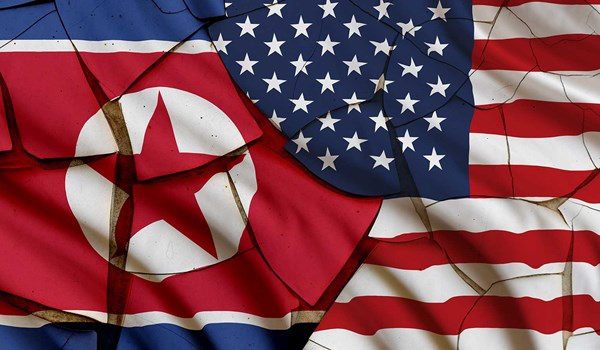
RNA - It’s not hard to see why. The delegation had a very positive visit in North Korea, further improving ties. They even visited the White House during which President Donald Trump suspiciously agreed to enter direct talks with North Korea’s Leader Kim Jong-un. South Korean officials are now talking with Japan’s government, trying to get them into talks as well. Japan is said to be open to the idea, perhaps because it no longer sees a reliable partner in Washington. South Korea, however, is as upbeat as possible on the situation, as for many reasons things just keep improving:
A-North Korea is using a softer touch in referring to President Trump in official statements, only a few months after branding Trump a “dotard” and hurling other epithets in a war of words that followed Pyongyang’s sixth nuclear test in September. This marks a significant shift in language. It’s a sign that Pyongyang is recognizing Trump’s agreement to a summit with Kim Jong-un – even though North Korea has not responded publicly on Trump’s decision to meet with Kim “by May” at a yet-to-be-disclosed location.
B-A similar summit might help Japanese Prime Minister Shinzo Abe more than Kim Jong-un. He knows that North Korean ballistic missiles with nuclear warheads could easily fly over Tokyo. He also knows that Korean Peninsula developments are proceeding at unprecedented speed. Then why not seek a separate summit with the North Korean leader as well?
C-It is wrong to see Prime Minister Abe is meeting Kim Jong-un directly to talk about the fate of abducted Japanese citizens. That’s beside the point. The diplomatic offensive overseas might also be helpful to divert attention from a domestic running sore, for Abe is being buffeted by a cronyism scandal that refuses to die a quiet death. But if such talks happen, the common subject of discussion will have to be regional peace and security.
D-Japan and South Korea continue to closely coordinate policies - with an eye on the US of course. They wish to make progress on their independent efforts to reach a comprehensive resolution of the nuclear, missile, and abduction (of Japanese citizens issues). They want to review their way forward from the perspective of the most effective approach to ending the arms race, which only benefits American weapons manufacturers.
E-The officials in Tokyo and Seoul have been blindsided by the surprise news that President Trump has enthusiastically accepted Kim Jong-un’s offer of a summit. They wonder how come Trump sells them weapons to counter the so-called North Korean nuclear threats with “maximum pressure” but simultaneously presses forward with engagement policies – which are now bearing spectacular fruit – with the North. With Trump tentatively scheduled to summit with Kim Jong-un, Japan’s Prime Minister Shinzo Abe and South Korea’s President Moon Jae-in may not wish to be left behind by developments. Far from it, they are climbing aboard the engagement bandwagon.
F-Tokyo’s and Seoul’s reliance on Washington’s security guarantees makes friending Trump a necessary evil. That has backfired after Kim Jong-un’s offer of a summit. His offer ends Washington’s Pyongyang-bashing policy, sending shock-waves throughout the region and threatening its long-established security ties with Tokyo and Seoul. Trump’s suspicious decision, the surprise news that he has enthusiastically accepted Kim Jong-un’s offer - without preconditions or progress on de-nuclearization - has caught best-buddies Abe and Moon completely unawares. In consequence, they are now more cautious toward America’s tweeter-in-chief, and wisely so. They both face a more complex geopolitical balancing act. Not only must they navigate Trump’s provocations, but also his proxy fight with Beijing.
Both Japan and South Korea, which rely on the US security blanket, spent much of 2017 paying the price for welcoming US missile-defense systems and Trump’s zero-sum worldview that were only in America’s favor and the Military-Industrial Complex. Pyongyang retaliated by testing new ballistic missiles and nuclear tests.
Now Abe's and Moon’s courtship of Trump appears to be unraveling. America’s favorite allies don’t want to see the repeat of a near-impossible position, where America walks over allies to engage “the enemy” amid a nuclear standoff. By willing to talk to Kim Jong-un, both Abe and Moon are proving they have got some game too. The success of their Pyongyang outreach efforts has Trump playing catch up too. Trump is scrambling to arrange a Trump-Kim summit to keep up with Abe and Moon.
And they are taking notes. Even though the target of Trump’s engagement with North Korea is dismantling its nuclear program, the biggest collateral damage will be sustained by US allies Japan and South Korea. Here, Trump claims ‘America First’ doesn’t mean America last. What it does mean is that Washington’s allies don’t matter much in this diplomatic gambit.
Funny how Trump also has nicer words for Kim Jong-un – than his most vital allies. But then Abe and Moon are already well-schooled in the Trumpian worldview that the whole world is the enemy and that “America comes first.” If nothing else, it’s a wake-up call, a reminder that if Trump is unfriended during the summits with Kim Jong-un, Abe and Moon won’t lose anything, and that they must look elsewhere for trusted partnership in pursuing regional peace in spite of the huge skepticism of many observers.
847/940